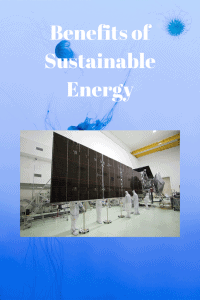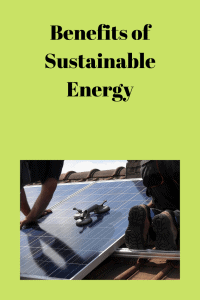
Benefits of Sustainable Energy is huge in the world.
Humans have done much in their millennia of civilization.
They have erected monuments, built cities, and carved nations from the wilderness.
In the process, they have darkened their skies with soot and smoke, polluted their water with chemicals, and littered the oceans with plastic.
By building their great cities, humanity has carved out the earth for coal and oil and cleared forests for wood.
As a result, the world is quickly reaching a climate crisis from which there may be no turning back.
Oil and coal run out, and when they do, new sources of energy will be needed to replace them.
The greatest benefits of sustainable energy are the fact that they are less harmful to the environment in the long term.
Solar panels, windmills, electrical dams, and nuclear energy are excellent alternatives to the use of non-renewable resources because of the minimal waste they produce.
Solar
Solar energy is produced via solar panels to create electrical and thermal power.
A major advantage of solar energy is the versatility of scale.
A single home can have solar panels to ease energy costs, an entire power plant could be devoted solely to solar power, and any variation of energy harvesting in between is possible.
Wind
Wind energy is provided by turbines turned to generate electricity in a similar manner to water with electrical dams.
Wind power is great for turning high-wind areas into wind farms, converting otherwise difficult to use land into a power source.
Nuclear

Effectively a gigantic steam engine, nuclear power is one of the best options for generating sustainable energy.
Nuclear power is capable of supplying vast amounts of energy.
Once, nuclear waste from such productions was a major problem, but now nuclear power generates less waste, and the waste can also be reused in the process of generating energy.
Properly constructed and maintained, nuclear reactors are one of the best options when it comes to sustainable energy.
Other

Biogas and geothermal energy are other options for sustainable power. Using composting waste to create natural gas and use of thermal power are excellent ways to create power, but are less viable as geothermal is tied to suitable land. Biogas has similar issues due to the amount of land necessary, as well as potential smells.
Power from hydroelectric dams is already so common that if a dam can be there, it already is. Thus, while available, expansion is unlikely.
Conclusion
The benefits of sustainable energy are clear to those who see them.
The ability to generate power without relying on natural resources that will eventually become exhausted is just one of the many benefits of such energy sources.
Whether harvesting the power of the sun to power a single home, the use of wind turbines to power a farming town, or a nuclear reactor to power an entire city and then some, sustainable energies have clear advantages over coal and oil.
Sooner or later, the need for sustainable energy as a primary power source will become apparent. One can hope that by then it is not too late.
